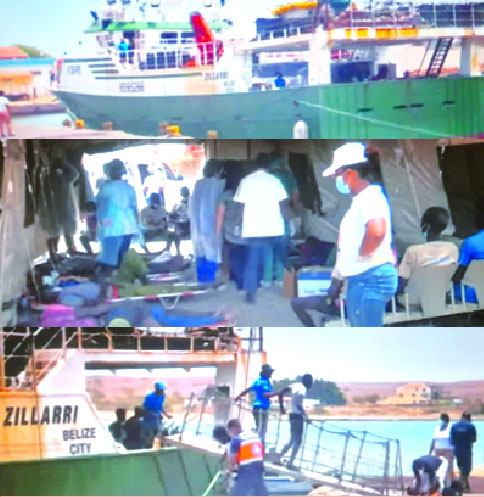Case of the Fass Boye Canoe: Complicated Times in Sal!

Two of the seven Senegalese from the group of 38 survivors of the canoe rescued off the island of Sal last Tuesday, hospitalized for four days at the Ramiro Figueiras Regional Hospital, could be transferred to Agostinho Neto (Han) Hospital in Praia if their clinical condition (high fever and kidney problems) does not improve in the next few hours. The information was given to the Daily by the president of the Association of Senegalese residing in Sal, Médoune Ndiaye, and the National Police who are closely monitoring their state of health with the local health authorities. The 32 other survivors are at the Ramiro Figueiras School in Espargos, where they are cared for by a multidisciplinary team made up of the national civil protection services, the town hall, the national police, the High Authority for Migration, the Public Prosecutor’s Office, the Judicial Police and other government entities, which are also intensifying their efforts to identify all the occupants of the canoe.
The 32 other survivors are at the Ramiro Figueiras School in Espargos, where they are cared for by a multidisciplinary team made up of the national civil protection services, the town hall, the national police, the High Authority for Migration, the Public Prosecutor’s Office, the Judicial Police and other government entities, which are also intensifying their efforts to identify all the occupants of the canoe. President of the Association of Senegalese residing in Sal, Médoune Ndiaye takes stock: “I am here in the hospital, and according to the doctors, two Senegalese could be transferred to the Central Hospital of Praia, because their condition is very delicate. » Médoune Ndiaye, who hopes that his compatriots will recover well, also assures that « the Cape Verdean authorities in Sal continue to do a good job » by providing all the necessary support to the survivors.
32 people hosted at the Ramiro Figueiras Public School
On the side of the National Police of Sal, according to its spokesman Gilson Tavares, the process of identifying the occupants of the canoe is continuing. “They had no documents, but at present most of them have been identified, and only two remain in hospital under intensive medical care,” he said. In the meantime, Gilson Tavares assured that the counting will continue until the Cape Verdean and Senegalese authorities decide the fate of the migrants and also whether the dead will be repatriated to Dakar.
In less than a year, at least three canoes have run aground on the Cape Verde Islands. The most recent case, the canoe of the 101 migrants from Fass Boye, recovered 150 miles from the island of Sal on Tuesday, triggered a new alarm on the technical limits of the countries of the Atlantic seaboard, and Cape Verde in particular, to deal with the scourge of migration. José Viana, president of the Platform of African Communities, believes that it is time for the Cape Verdean government to start looking for alternatives to welcome these migrants. “This situation is really worrying. It calls on all of us to seek measures to alleviate the suffering of these people. We must take preventive measures, find out how to take care of these people and guide them. That is why I think the time has come for Cape Verde not only to have a multidisciplinary team to provide humanitarian assistance, but also for the country to have a reception center for this purpose”, he declared to the press on Thursday.
The Minister of the Interior, Paulo Rocha, for his part assured that the Cape Verdean government will continue to provide all its support to the victims of this scourge. But, he specified that Cape Verde will not be able to do more, because the country also has its own limits. “We will continue to provide humanitarian assistance for the full recovery of those affected, but we are concerned about our borders and the national authorities will take measures to ensure the safety of those who come and of our citizens”, advance Paulo Rocha, questioned by the BBC.
Faced with this scenario, the Cape Verdean minister rules out any possibility of creating reception or detention centres. The only alternative is therefore, according to him, to repatriate these migrants to their country of origin. “There are other issues that will be handled diplomatically. We do not plan to maintain permanent reception centres here because it does not make sense, given our status as an archipelagic country with all our problems,” Paulo Rocha said on Thursday, in response to the position of the President of the Platform of Immigrant Communities of Cape Verde.
The canoe, with 101 passengers, left the fishing area of Fass Boye, located in the department of Tivaouane, on July 10, bound for Spain. After 20 days of sailing on the high seas, they had no more food and 56 of them would have died of starvation and would have been thrown overboard. The boat then continued its navigation towards uncertainty with 45 people including 38 alive and 7 corpses.
For the moment, the seven bodies are still in the morgue of the Regional Hospital of Sal, awaiting a decision from the Cape Verdean and Senegalese authorities on this subject. In the meantime, the Senegalese ambassador to Cape Verde is due to go there on Tuesday August 22 to follow the situation of migrants, in particular that of Senegalese.
By Arlinda NEVES (Special Correspondent)

